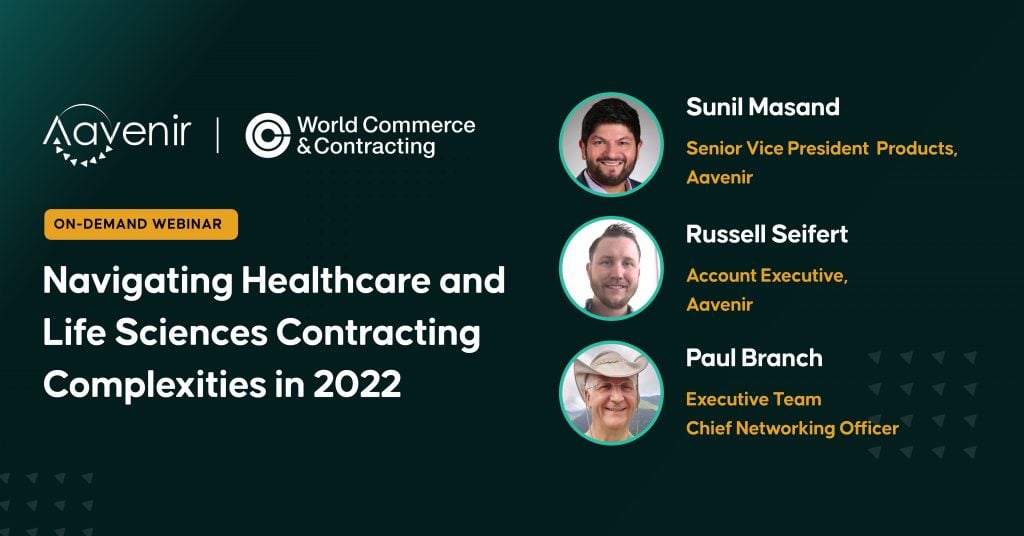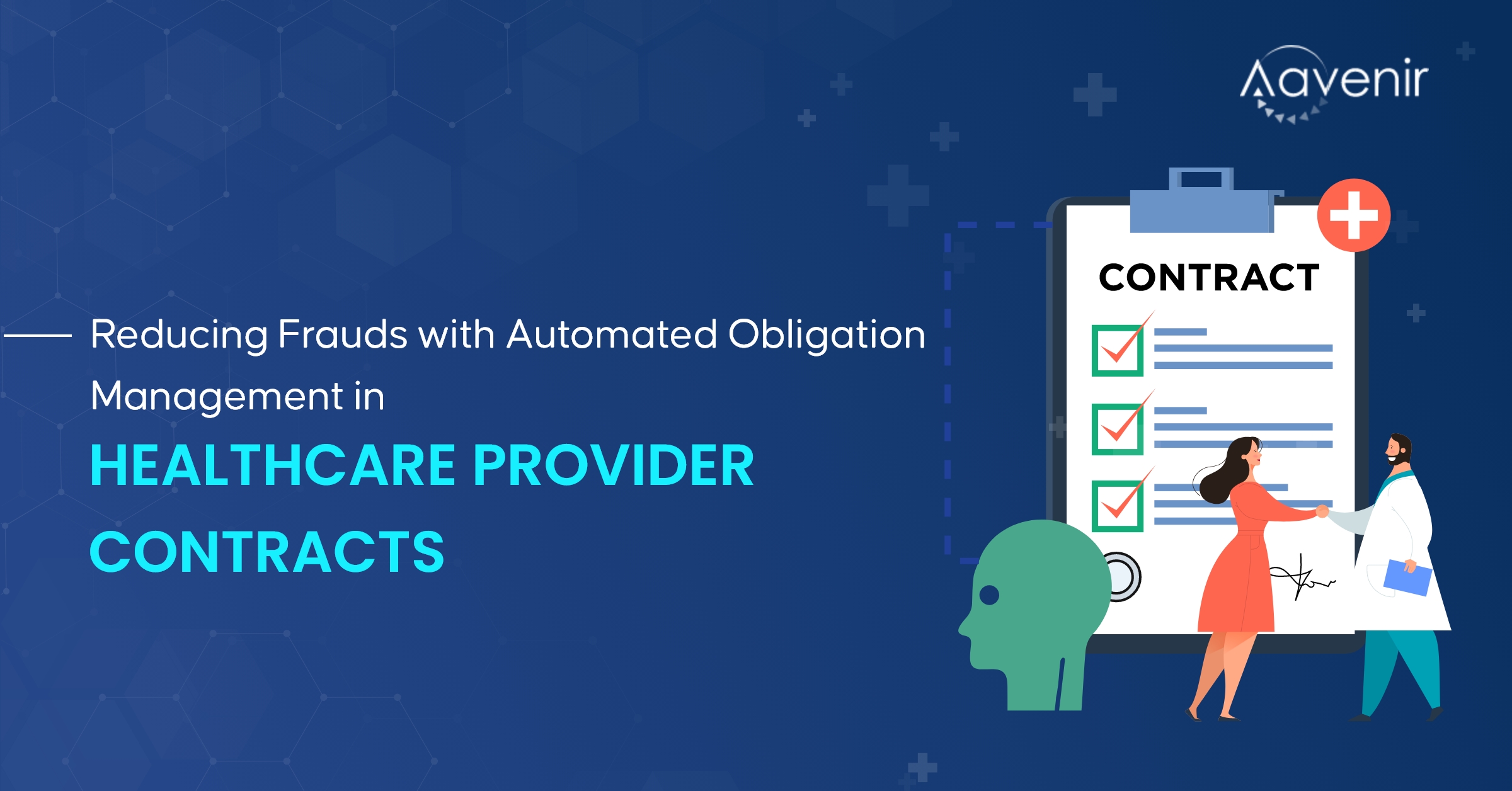Fraud and abuse in healthcare are costing billions of dollars each year – well, not surprising! This article sheds light on how one can reduce fraud risk in Healthcare Provider Contracts with Automated Obligation Management. Keep reading!
The U.S. Department of Justice (DOJ) has recently charged 138 defendants, including 42 doctors, nurses, and other licensed medical professionals, in a coordinated crackdown on various healthcare fraud schemes.
Common types of healthcare fraud include:
- billing for no-show appointments
- submitting claims for services at a higher complexity and higher claim reimbursement levels than presented or documented
- billing for services not provided, and payments made for referrals

Why does Healthcare Fraud Occur?
Power, greed, and corruption are the main motives, but not all occurrences of fraud may be intentional. Some arise due to non-compliance or failure to meet obligations. To detect and prevent healthcare fraud and abuse, healthcare providers should implement a robust compliance program to improve medical billing practices and ensure provider obligations are built into contracts and tracked effectively.
5 Common Types of Healthcare Fraud Detected in 2021 Across the United States
Billing for services not rendered
Two New Jersey residents conspired and schemed with others to defraud the New Jersey Traumatic Brain Injury Fund by misappropriating over $4.5 million in fraudulent vendor payments for services never delivered (from 2009 to June 2019).
This type of fraud occurs when the medical provider or its facility submits Claim Forms to government health care plans and insurers for services and care never provided. The corresponding patient records lacked enough supporting documentation.
Misrepresenting date, location, or provider of service
A Houston chiropractor was charged for falsely billing Medicare and Tricare for more than $3.9 million for medical procedures that she was not licensed to perform.
Healthcare practitioners may get more money if they conduct multiple encounters with the patient, e.g., visit consultation and treatment on two different days instead of one. Each “patient encounter” is usually considered a separate billable service. Also, medical practitioners may submit insurance claim forms indicating that they were the ones that provided care, but in reality, lesser-educated health professionals conducted the therapy.
Incorrect reporting of diagnosis or procedures
A Texas dermatopathologist and his clinic were accused of submitting almost $4.2 million in fraudulent claims to Tricare in a lawsuit filed by the US Attorney’s Office for the Northern District of Texas.
Unscrupulous providers can bill for extra services if they report procedures performed for false, serious diagnoses.
Corruption and kickbacks
Two Texas residents had exchanged over $28 million in illegal kickback payments for arranging and referring to pharmacogenetic tests during the conspiracy.
If a physician or medical provider uses any payment or compensation to encourage a patient to come to their office,or encourage another medical provider to refer patients to their office or facility, that is a kickback.
False issuance of prescription drugs
According to the CASA report, 28.4 percent of surveyed pharmacists reported that they didn’t regularly validate the DEA number of the prescribing physicians assigned to them by the U.S. Drug Enforcement Administration, which permits them to prescribe drugs before dispensing controlled drugs.
Some patients “doctor shop” to obtain drug prescriptions — especially painkillers. However, doctors are often unaware that their patients have already visited other doctors for the same or similar medications. Fraudsters then easily recover the cost of a visit to the doctors, fill false prescriptions, and sell some or all of the drugs illegally.

Solution – Healthcare Obligation Management and Compliance Programs
Complying with the myriad of regulations can be challenging for healthcare providers who focus on priorities, including medical billing, care delivery, payer compliance, and revenue cycle management.
Can implementing healthcare obligation management and compliance solutions combat risks of healthcare fraud in healthcare provider contracts?
As the healthcare industry moves to new care delivery and claims reimbursement standards, healthcare fraud, and abuse regulations will likely evolve. Providers should ensure their organizations stay up-to-date and comply with new regulations to prevent potential fraud investigations.
Providers should understand fundamental healthcare fraud laws, implement a compliance program, and improve medical billing and business operations that deter participation in healthcare fraud and abuse activities.
Healthcare agreements span the entire value chain from manufacturing, clinical research, equipment, and supplies procurement to provider, payer, and pharmacy agreements. These agreements take various shapes and forms, such as :
- Physician Employment Agreements
- Non-Physician Employment Agreements
- Managed Care
- Pharmacy Agreements
- Research and Grant Agreements
- Affiliation Agreements
- Equipment: Lease, Purchase, and Service
- Real Estate Leases
Regulatory compliance obligations govern all agreements in the healthcare world. Such regulations include HIPAA, Stark I, II, III; False Claims, HITECH, Federal Anti-Kickback Statute, and JCAHO to name a few.
In general, the governing body of a healthcare organization is responsible for its conduct. Consequently, the governing body and the executive officers of the healthcare organization will bear the ultimate responsibility for a healthcare organization’s compliance, or lack thereof. Regulatory compliance consultants assist healthcare organizations in achieving conformance with government regulations. They typically advise senior management and help develop processes and programs to ensure organization-wide compliance with applicable laws and standards.
Some critical pointers you should know to combat fraud in Healthcare Provider Contracts
- The Stark Law is a strict liability statute with huge potential penalties that could attach to even technical violations of the law, such as a lapsed contract or a missing signature. Stark law prohibits any provider from submitting claims for payment to Medicare for services provided due to a prohibited referral. Contract management can help by identifying any Conflicts of Interest a physician may have.
- Federal Anti-Kickback Law protects patients and federal health care programs from fraud and abuse by curtailing the corrupting influence of money on health care decisions. Also, it prohibits the exchange, offers to exchange, or receipt of anything of value to induce or reward referrals of items or services payable by federal healthcare programs.
- False Claims Act imposes liability on any person who:
- submits a claim to the federal Government knowing that it is false.
- submits a false record to obtain payment from the Government
- obtains money from the Federal Government to which they may not be entitled and uses false records to retain the money
- The Joint Commission on Accreditation of Healthcare Organizations (JCAHO) accredits and certifies healthcare organizations and programs identifying an organization’s commitment to meeting specific performance standards.
Implications of Violating Healthcare Compliance
There is a range of behavior that we call fraud, waste, and abuse, all of which have as their central theme the improper removal of funds from the healthcare system.
- Civil penalties for violating the civil False Claims Act may include recovery of up to 3 times the amount of damages sustained by the Government due to the false claims, plus financial penalties per false claim filed.
- Criminal penalties and administrative sanctions for violating the Anti-Kickback Statute (AKS) may include fines, imprisonment, and exclusion from participation in the Federal health care program. Under the Civil Money Penalties Law (CMPL), penalties for violating the AKS may include 3 times the amount of the kickback.
- Penalties for physicians who violate the Stark Law may include fines, Civil Monetary Penalties (CMPs) for each service, repayment of claims, and potential exclusion from participation in Federal healthcare programs.
- Penalties for violating the Criminal Healthcare Fraud Statute may include fines, imprisonment, or both.
Healthcare Compliance Program to Reduce Fraud Risk in Healthcare Provider Contracts
Importance and Elements of a Well-designed Healthcare Compliance Program to Reduce Fraud Risk in Healthcare Provider Contracts
By implementing a well-designed compliance program, a healthcare organization can:
- Speed up and optimize proper payment of claims
- Minimize billing and “creative” invoicing mistakes
- Reduce the chances of a HealthCare Financing Administration (HCFA) or Office of Inspector General (OIG) audit
- Avoid conflicts with self-referral and anti-kickback statutes
Every healthcare entity must have an effective compliance program. It encourages employees to report problems, and it creates a process by which the organization can identify and prevent criminal and unethical conduct. It can also help identify and correct compliance problems and violations before they are discovered by the Government or reported by a whistleblower.
In the absence of an effective compliance program, you risk the chance of increased culpability if healthcare fraud is identified within your (healthcare) entity, which will lead to allegations of deliberate ignorance – triggering greater scrutiny and investigation.
The OIG has developed a series of voluntary compliance program guidance documents directed at various healthcare industry segments, including hospitals, nursing homes, third-party billers, and durable medical equipment suppliers. The purpose is, to encourage the development and use of internal controls to monitor adherence to applicable statutes, regulations, and program requirements.
Guidelines and Best practices
Developed by the HHS Office of Inspector General (OIG), there are seven guidelines and best practices to ensure compliance, with HIPAA laws.
The seven elements of an Effective Healthcare Compliance Program include:
- Implementing written policies, procedures, and standards of conduct.
- Designating a Compliance Officer and a compliance committee.
- Conducting effective training and education.
- Developing effective lines of communication.
- Conducting internal monitoring and auditing.
- Enforcing standards through well-publicized disciplinary guidelines.
- Responding promptly to detected offenses and undertaking corrective action.
Embrace Healthcare Obligation Management For Fraud Prevention
Thousands of healthcare professionals are still working tirelessly and called upon to work outside their usual specialties and make difficult decisions. Therefore, healthcare providers, patients, and the Government need to understand their rights and responsibilities around patient care. The first step is to identify obligations at each level – provider, patient, and government and centralize a process to eliminate fraudulent practices.
Artificial Intelligence (AI) is a highly advanced technology that can identify emerging threats using predictive algorithms. AI-enabled obligation and compliance management solutions can assist in oversight and tracking crucial information to ensure compliance and accuracy, thereby helping mitigate healthcare fraud.
For example, modern CLM solutions use AI to auto-discover key contract obligations and fulfill them on time using digital workflows. Intelligent AI metadata extraction helps healthcare organizations provide oversight to contracts to ensure contracting entities follow regulations and are aware of any safe harbors provided under the anti-kickback statute.

Over to You
Ultimately, neither new technology nor improved processes will be enough to avoid healthcare fraud. You can achieve true success by integrating technology with robust claims that include data, provider data, and external data.
Healthcare organizations can introduce data, security, audit standards, and performance expectations in agreements or implement obligation management solutions while ensuring that compromised dependent data does not become a source for fraud. For example, organizations can include key clauses about the scope of services, ownership, and security of data, limitation of liability, SLAs, tenure, renewal, and termination to safeguard themselves from breach occurrences.
Here, legal and contract management teams come to the rescue in the healthcare sector. They can help ensure their contracts include clauses, obligations, and solutions defensible against future fraud allegations and can prove compliance.
Request a Demo today to see how Aavenir Solutions can make your job easier and more enjoyable.
Watch this On-demand Webinar to Learn More






